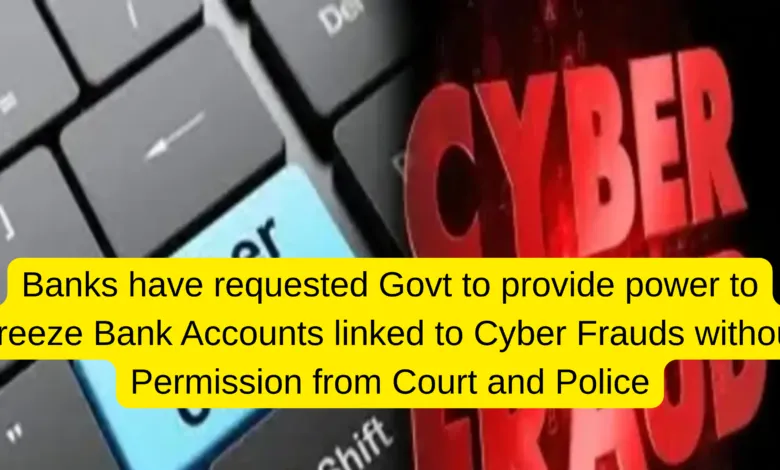Banks have requested Govt to provide power to Freeze Bank Accounts linked to Cyber Frauds without Permission from Court and Police

Banks in India have recently requested the power to freeze bank accounts linked to cyber frauds without waiting for court or police approval. Currently, banks can only block suspicious accounts based on internal alerts, but under the Prevention of Money Laundering Act (PMLA), they are not legally allowed to freeze accounts without proper authorization from law enforcement or a court. This creates a significant delay, which allows fraudsters to escape or move the stolen money before banks can act. The Indian Banks’ Association (IBA) has suggested that this delay needs to be addressed and that banks should be given the authority to freeze such accounts instantly.
A working group formed by the Indian Banks’ Association has recommended that this issue be taken up with the Reserve Bank of India (RBI) for further consideration. Under the Prevention of Money Laundering Act (PMLA), they lack the legal authority to freeze or block customer accounts without proper authorisation. Currently, banks can block accounts based on internal alerts.
A major concern is the rise of mule accounts, which are used by cybercriminals to move stolen funds. While banks freeze thousands of these accounts annually, criminals can quickly open new ones by exploiting system vulnerabilities. To address this, banks are considering various strategies, such as using the Election Commission’s database to verify customer details when accounts are opened using voter ID cards or Form 60. Additionally, they may limit the number of transactions allowed on these accounts to reduce their misuse.
The IBA report also highlights the need for technology-driven solutions to fight cybercrime, suggesting that artificial intelligence (AI) and machine learning (ML) could help banks better detect and prevent fraudulent activities. By incorporating these technologies into their transaction monitoring systems, banks can more effectively predict and stop cyber fraud before it happens.
The report emphasizes the importance of collaboration between banks, regulators, law enforcement, and technology providers to strengthen the fight against mule accounts and cybercrime. Investments in advanced technology, staff training, and policy updates are crucial for improving security and protecting customers from fraud. This comprehensive approach aims to create a safer banking system and reduce the risk of financial loss due to cybercriminal activities.
